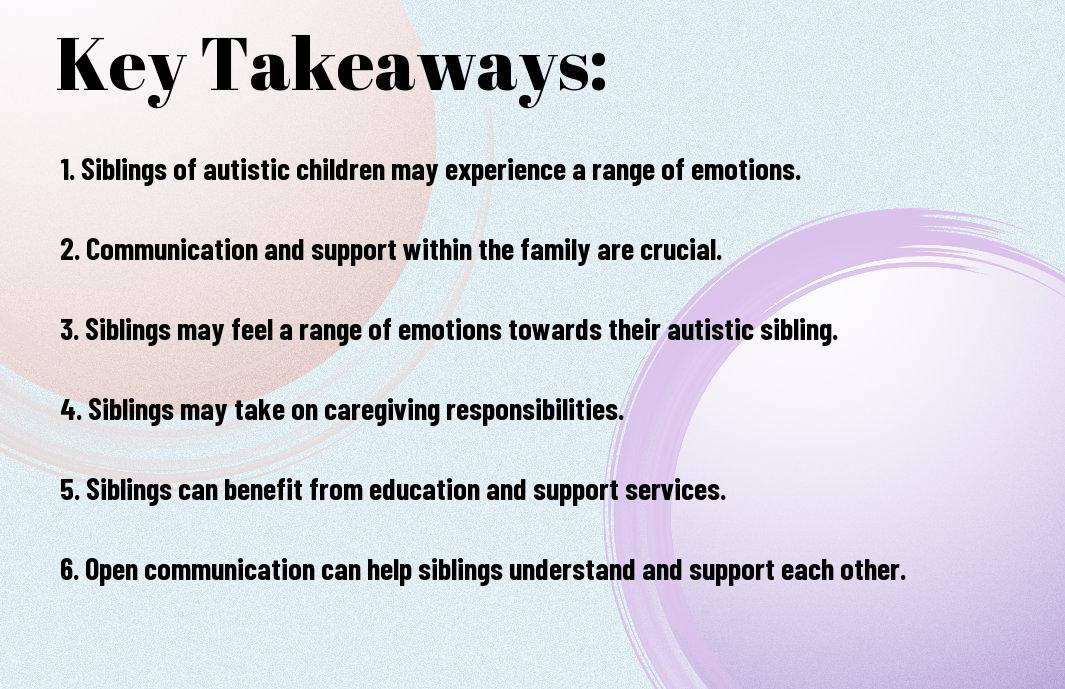An often-overlooked aspect of autism is its impact on siblings within the family unit. Understanding the unique perspectives of siblings of individuals with autism is crucial in order to provide appropriate support and empathy within the family dynamic. Siblings of individuals with autism often experience a range of emotions from frustration to compassion, and their experiences can greatly shape the overall family dynamic. It is important to acknowledge the challenges and rewards of having a sibling with autism, as well as the potential long-term effects on their own well-being. In this blog post, we will explore the complexities of sibling relationships within families affected by autism, and discuss ways in which parents and professionals can support the unique needs of these individuals.
Key Takeaways:
- Siblings play a crucial role in the family dynamics of individuals with autism, often taking on responsibilities and developing a unique understanding of their sibling’s needs.
- Communication and support are key in fostering positive relationships between siblings and individuals with autism, as well as promoting overall family well-being.
- Challenges and emotions experienced by siblings of individuals with autism should not be overlooked, and it is important to provide them with the necessary support and resources to navigate their own experiences.


Autism Through the Lens of Siblings
When looking at autism within the family dynamic, it is essential to consider the perspective of siblings. Siblings play a crucial role in the lives of individuals with autism, often taking on responsibilities and experiencing unique emotional challenges. By understanding the experiences of siblings, we can gain valuable insights into the impact of autism on the family unit.
Siblings’ Roles and Responsibilities
Siblings of individuals with autism often take on additional roles and responsibilities within the family. They may act as advocates, caretakers, and teachers to their sibling with autism. This can create a significant impact on their daily lives, as they juggle their own needs with the needs of their sibling with autism. Despite the challenges, many siblings develop a sense of compassion, resilience, and empathy through their experiences.
Emotional Impact on Siblings
The emotional impact of having a sibling with autism can be profound. Siblings may experience a range of emotions, including frustration, guilt, and sadness. They may also feel overlooked or neglected due to the additional attention and support their sibling with autism requires. It is essential to acknowledge and address the emotional well-being of siblings, as their experiences can have a long-lasting effect on their mental health and overall development.
Understanding the emotional impact on siblings is crucial in providing holistic support to the entire family unit affected by autism. By recognising the challenges and promoting positive coping strategies, we can create a more inclusive and supportive environment for siblings of individuals with autism.
Navigating Family Life
When a family member is diagnosed with autism, it can have a significant impact on the dynamics of the entire family. Siblings of children with autism often face unique challenges and experiences that can shape their understanding of the world around them. In this blog post, we will explore the perspectives of siblings of individuals with autism, and how they navigate the complexities of family life.
For more insights into the sibling perspective on autism, you can check out this Sibling Perspective on Autism.
Communication Challenges and Strategies
Siblings of individuals with autism may encounter communication challenges within their family dynamic. Communication can be disrupted due to the unique communication style of their sibling with autism, which may lead to misunderstandings and frustrations. Strategies such as patience and open communication can help siblings develop a better understanding of their autistic sibling’s communication needs and build stronger relationships within the family.
Adaptation and Coping Mechanisms for Siblings
Living with a sibling who has autism can require adaptation and coping mechanisms for siblings to navigate the family environment. Siblings may need to learn how to manage their emotions and find support outside the family, whether it be through friends, support groups, or counselling. These adaptation strategies are crucial for maintaining the emotional well-being of siblings within the family unit.
Understanding the adaptation and coping mechanisms for siblings living with autism within the family dynamic is crucial for providing them with the necessary support and resources to navigate their experiences.

Support Systems and Resources
Educational Programs and Interventions
When it comes to supporting siblings of autistic individuals, educational programs and interventions play a crucial role. These programmes aim to equip the siblings with the necessary knowledge and skills to understand and interact with their autistic sibling. They may focus on teaching effective communication strategies, fostering empathy and understanding, and providing coping mechanisms for the challenges that may arise within the family dynamic.
It is essential for these programs to be tailored to the individual needs of the sibling, taking into account their age, developmental stage, and personal experiences. Early intervention and ongoing support are key in ensuring the well-being and mental health of siblings in the long term.
Support Networks for Siblings of Autistic Individuals
Support networks provide invaluable resources for siblings of autistic individuals. These networks offer a platform for siblings to connect with others who share similar experiences, fostering a sense of community and understanding. They may also provide access to professional advice, guidance, and practical support for both the siblings and their families.
Being part of a support network can have a profoundly positive impact on the siblings’ emotional well-being and can help them develop a sense of resilience and empowerment in their unique family dynamic.
Finding the right support network can make a significant difference in the lives of siblings of autistic individuals, offering a source of strength and understanding in their journey.
Perspectives and Insights
In this chapter, we will explore the unique perspectives and valuable insights of siblings of individuals with autism. Understanding their viewpoint is crucial in gaining a holistic understanding of the impact of autism on family dynamics.
Personal Stories and Testimonies
The personal stories and testimonies of siblings provide a raw and real insight into the challenges and joys of living with a sibling who has autism. These stories often highlight the unique bond and the complex emotions experienced within the family dynamic. Siblings share their experiences of navigating through the ups and downs, offering invaluable insight into their world.
Contributions to Autism Awareness and Understanding
Siblings of individuals with autism often play a significant role in raising awareness and promoting understanding of autism within their communities. Their unique perspective and lived experiences can contribute to educating others about the condition, breaking down stereotypes, and advocating for greater acceptance and support. Their contributions are crucial in creating a more inclusive and empathetic society for individuals with autism.
The contributions of siblings to autism awareness and understanding go beyond personal anecdotes. Through their advocacy, they are shaping a more informed and compassionate society, challenging misconceptions and promoting acceptance and support for individuals with autism. Their efforts are crucial in breaking down barriers and fostering a more inclusive environment for those with autism.
Conclusion: Autism and Family Dynamics – Siblings’ Perspectives
Understanding the impact of autism on family dynamics, particularly from the perspective of siblings, is crucial in providing comprehensive support to individuals on the autism spectrum. Siblings of individuals with autism may experience a range of emotions and challenges, from feelings of responsibility and compassion to frustration and isolation. It is important for parents and caregivers to acknowledge and address the unique needs of these siblings, providing them with a supportive environment and access to resources that can help them navigate their experiences. To gain valuable insights and tips on fostering a strong relationship with a sibling with autism, visit Sibling Perspective on Autism: Tips For Strong Relationship for valuable resources and guidance. By working together to understand and support the needs of siblings, we can foster a nurturing and inclusive family environment for all.
FAQ
Q: What is the impact of autism on the siblings’ perspectives within the family dynamic?
A: Autism can have a significant impact on the siblings’ perspectives within the family dynamic. Siblings may experience a range of emotions and challenges as they navigate their relationship with their autistic brother or sister.
Q: How can autism affect the relationship between siblings?
A: Autism can affect the relationship between siblings in various ways. Siblings may need to adapt to their brother or sister’s unique communication and behavioural patterns, which can sometimes create tension or misunderstanding.
Q: What are some common challenges that siblings of an autistic individual may face?
A: Siblings of an autistic individual may face challenges such as feeling overlooked or neglected, experiencing feelings of guilt or responsibility, and struggling to understand their sibling’s condition.
Q: How can parents support the siblings of an autistic individual?
A: Parents can support siblings by providing them with open communication, reassurance, and opportunities for individual attention and support. It is important for parents to acknowledge and validate the experiences and emotions of all their children.
Q: What are some strategies for promoting positive sibling relationships in families with an autistic member?
A: Strategies for promoting positive sibling relationships include fostering understanding and empathy, creating a supportive and inclusive family environment, and involving siblings in their autistic brother or sister’s care and support.
Q: What resources are available for siblings of autistic individuals?
A: There are various support groups, counselling services, and online resources specifically designed to support siblings of autistic individuals. These resources can provide siblings with the opportunity to connect with others who share similar experiences.
Q: How can siblings of autistic individuals advocate for themselves within the family dynamic?
A: Siblings can advocate for themselves by expressing their needs and concerns to their parents, seeking support from trusted adults or professionals, and actively participating in discussions and decision-making regarding their sibling’s care and well-being.







